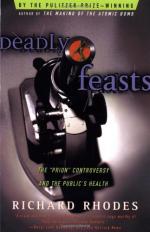|
This section contains 1,406 words (approx. 5 pages at 300 words per page) |

|
In 1997 Stanley Prusiner was awarded the Nobel Prize in physiology or medicine for a revolutionary theory about the mechanisms of infection. His theory, the "prion hypothesis," concerns an unusual protein, the prion, which occurs in the complete absence of DNA and RNA. According to Prusiner's theory, the prion differs from other well-known infections agents including bacteria and viruses. While the latter rely on nucleic acid for survival and replication, the prion is made of a protein and lacks nucleic acid. Both the existence of the prion and the underlying mode of infection are unprecedented in medical sciences. While several critical issues remain to be addressed, the prion hypothesis may furnish a plausible framework to understand the pathogenesis of several deadly brain diseases of the central nervous system.
 Stanley Prusiner won the 1997 Nobel prize in physiology or medicine for his research on prions.
Stanley Prusiner won the 1997 Nobel prize in physiology or medicine for his research on prions.
A New Infectious Agent
Prion is...
|
This section contains 1,406 words (approx. 5 pages at 300 words per page) |

|


